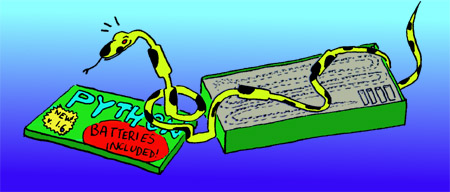Because Python comes with batteries included!
Scientists
need to do a lot of data processing ... I chosed the python
programming language
to load data, process them, generate graphs and save results. Most of
the time I use iPython, an
enhanced pythons shell with a few libraries I wrote to make the job
easier.
hin2xyz.py (molecular modeling) : is a small program that converts Hyperchem ".him" files in atomic coordinates ".xyz". Nowadays, OpenBabel works very well and does the job better.
addentry (bibliographic tool) : small program that append the bibliographic informations extracted form "scifinder" to a BibTex database (old).
volta is the program I wrote to do cyclic voltammetry on EG&G potentiostats using a serial link. I did all the electrochemistry of my thesis with it.
mathlib.py and integre.py: contain a few mathematical functions for data-set derivation, integration, Savitsky-Golay smoothing, linear regression, least square interpolation, .... mainly oriented towards electrochemistry.
libSEC.py contains mainly procedures and functions for loading, processing and printing data from electrochemical equipement : potentiostat EG&G and VoltaLab, 3D-spectroelectrochemistry processing and so on. All the 2D graphics are made with grace and the 3D figures are made with gnuplot. This program uses also numarray, GracePlot.py and grace_np.py
libcif.py: a library to read, write and check ".CIF" (Crystallographic Information File). It can be used as python interface for Platon to create structure representations, simulated X-Ray powder diffraction patterns and analysis report (in HTML). Here is the Library documentation and a report automatically generated using the Aspirine.cif. MergeCIF and Castep2cif are two progams built ont the libcif library. The first one addes the data from a second CIF file to the first one and compleet everything with the data generated by Platon. The second extracts the last structure of a CASTEP output file to a conventionnal CIF file.
EXIF.py: is a modified version of the exif-tag manipulation library for JPEG images. This library has been modified by Mike and is intensively used in Imgaizer
DeVig.py and DeVig-makefilter.py are two programs trying to evaluate and correct the "vignetting effect" on photos (edges that are darker than the center of the image). Usefull for color pre-processing before panoramic stitching. It uses PIL and contains a python implementation of 1D gaussian blur.
hin2xyz.py (molecular modeling) : is a small program that converts Hyperchem ".him" files in atomic coordinates ".xyz". Nowadays, OpenBabel works very well and does the job better.
addentry (bibliographic tool) : small program that append the bibliographic informations extracted form "scifinder" to a BibTex database (old).
volta is the program I wrote to do cyclic voltammetry on EG&G potentiostats using a serial link. I did all the electrochemistry of my thesis with it.
mathlib.py and integre.py: contain a few mathematical functions for data-set derivation, integration, Savitsky-Golay smoothing, linear regression, least square interpolation, .... mainly oriented towards electrochemistry.
libSEC.py contains mainly procedures and functions for loading, processing and printing data from electrochemical equipement : potentiostat EG&G and VoltaLab, 3D-spectroelectrochemistry processing and so on. All the 2D graphics are made with grace and the 3D figures are made with gnuplot. This program uses also numarray, GracePlot.py and grace_np.py
libcif.py: a library to read, write and check ".CIF" (Crystallographic Information File). It can be used as python interface for Platon to create structure representations, simulated X-Ray powder diffraction patterns and analysis report (in HTML). Here is the Library documentation and a report automatically generated using the Aspirine.cif. MergeCIF and Castep2cif are two progams built ont the libcif library. The first one addes the data from a second CIF file to the first one and compleet everything with the data generated by Platon. The second extracts the last structure of a CASTEP output file to a conventionnal CIF file.
EXIF.py: is a modified version of the exif-tag manipulation library for JPEG images. This library has been modified by Mike and is intensively used in Imgaizer
DeVig.py and DeVig-makefilter.py are two programs trying to evaluate and correct the "vignetting effect" on photos (edges that are darker than the center of the image). Usefull for color pre-processing before panoramic stitching. It uses PIL and contains a python implementation of 1D gaussian blur.
filter.py is an image (JPEG) filter that tries to moderate over-contrasted images. It uses PIL and numarray.
